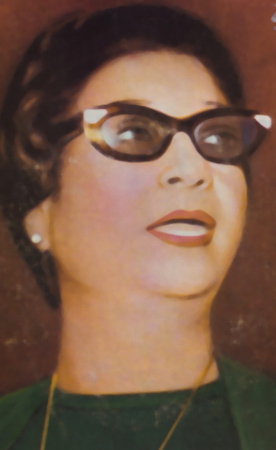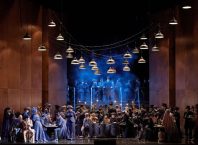It would be difficult, truly difficult, to overstate the reputation of Oum Kalthoum, “the Voice of Egypt” and quite possibly the greatest chanteuse that the Middle East has ever or will ever know. Even her life story is the stuff of which legends are made. When she was a child, her father – an Imam – recognising her precocious talent, disguised her as a boy and made her a part of the performing troupe he ran. A chance introduction to the poet Ahmad Rami set her on the path to fame and stardom. He wrote more than a hundred songs for her and introduced her to French and Arabic literature. It’s said that she described him as “a spiritual combination of inspired feelings, deep suppressed revolution, tranquility and devotion.”
By the 1930s, she had sung at the launch of Egypt’s first radio station, and hosted a legendary monthly residency, broadcast live across Egypt and the Arab world. It cemented the reputation she had burnished in her 1932 tour of Baghdad, Beirut and Damascus, making her perhaps the first pan-Arab superstar. King Farouk of Egypt bestowed upon her the highest honour in his gift, one usually reserved for fellow royalty. After Farouk’s overthrow by Nasser, her songs were banned from broadcast on the radio. When Nasser found out about this, his response was sharp: “What are they, crazy? Do you want Egypt to turn against us?”
Nasser was quite right in his circumspection; even he clutched on to her coat-tails for a while, scheduling speeches and broadcasts to run immediately after her monthly broadcasts. But most of all, she was not just the voice of the common people, she was a common person who made good but who never forgot her roots. When she died in 1975, her funeral was a state event. Millions thronged the street to catch sight of her cortege, more, it’s said, than when Nasser himself died 5 years previously.
Oum Kalthoum is remembered with affection in Israel too: devotees will have the opportunity for a rare treat next week, when a tribute to the Queen of the Nile will be staged at Jerusalem’s Sherover Hall, part of the 14th International Oud Festival. Performed by the Alfarabi Orchestra, Kalthoum’s songs will be performed by four contemporary Arab starts: Mustafa Dakhlel, Khalil Abu Nikola, Lubna Salameh and Riham Mustafa.
The Alfarabi Orchestra was founded in 1993 by conductor and musical director Sami Khsheibun, it has performed at festivals around the world. Kheshaiboun, a native of Kfar Kana in the Galilee, trained as a violinst at the Academy of Music and Dance in Jerusalem, and has placed particular emphasis throughout his career in advancing Arabic music techniques. Aside from the Alfarabi Orchestra, he has also performed as a soloist with many ensembles and orchestras, including the Israeli Philharmonic Orchestra and the Shesh Beysh Ensemble.
Queen of the Nile: Oum Kalthoum’s Classics
The Alfarabi Orchestra, conducted by Sami Kheshaiboun, with Mustafa Dakhlel, Khalil Abu Nikola, Lubna Salameh and Riham Mustafa
Sherover Hall, Jerusalem, 4th November 2013, 2100
The International Oud Festival will take place from October 31 – November 9, 2013. The full program may be viewed on the festival website. www.confederationhouse.org/en






